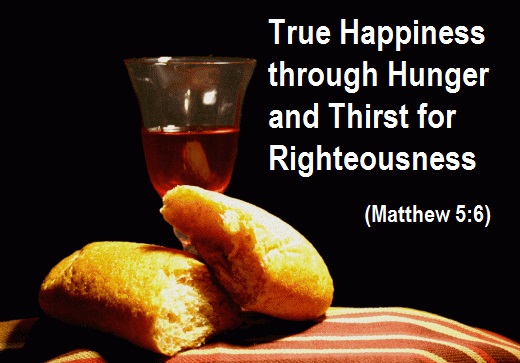True Happiness through Hunger and Thirst for Righteousness (Matthew 5:6)
Biologically
every living thing needs food and water to grow and to survive. It is said that
an average person can survive 21 days without food and 3 days without water. Hunger
and thirst is a sign of life. No one has to teach someone to be hunger and
thirst. It is natural for even a baby longing for mother’s milk. Peter writes
in the epistle, “Like newborn infants,
long for the pure spiritual milk, that by it you may grow up into
salvation” (1 Peter 2:2). A dead never have to hunger and thirst. It is
also a sign of good health. One of the most important questions a
doctor can ask a patient in the course of an examination is ‘how is your
appetites’. Because lack of appetites is always a cause of concern and may be a
symptom of serious disease. This same
principle can be applied for our spiritual life. When being a believer we have
little or no appetites for spiritual things, something is seriously wrong,
although outwardly everything seems perfectly in order. Scottish preacher Thomas Guthrie had already
warned us in the last century, when he said, “If you find yourself loving any pleasure better than your prayers, any
book better than the Bible, any house better than the house of God, any table
better than the Lord’s Table, any person better than Christ, any indulgence
better than the hope of heaven - take alarm!” At present there is
widespread lack of hunger and thirst for God and for HIS Word. Our Lord Jesus
Christ said blessed to those who hunger and thirst for righteousness, because
it is a sign of life as well as a sign of good health.
What
Does Jesus Mean?
“Blessed
are those who hunger and thirst for righteousness …” (vs. 6). New
Testament uses the word ‘peinao’
(πεινάω) literally and figuratively. It means literally ‘to be hungry’ and
figuratively it speaks of ‘to crave ardently’ or ‘to seek with eager desire’. Similarly
New Testament uses the word ‘dipsao’
(διψάω). Literally it means ‘to suffer thirst’ and figuratively it describes of
‘those who eagerly long for those things by which the soul is refreshed,
supported and strengthened’. Our Lord Jesus Christ used these two words ‘hunger
and thirst’ figuratively in order to describe the strong desire for something
which is necessary for sustenance of life. He also added the word
‘righteousness’ to express of what should we hunger and thirst for. New
Testament uses the Greek word ‘dikaiosyne’
(δικαιοσύνη) for ‘righteousness’. It defines the acceptable state of man before
God. It conveys two specific ideas. First, it speaks of the righteousness,
which God imputed in us as we put our trust personally in Jesus Christ for our
own salvation (Rom. 1:17, 3:22, Phil. 3:9). It is called justification. Second, it speaks of the righteousness for which the
Holy Spirit instigates us for holiness in our daily life (cf. Rom. 6:13-14). It
is called sanctification. If you eat only one
meal, does it satisfy you for the rest of your life? Absolutely not! Even though
that meal has satisfied you for the moment, your body naturally grows hungry
again as time passes. In the same way, as genuine believers we will continually hunger and thirst for
the righteousness.
Our Lord Jesus Christ
reflects on the true spiritual passion to know God intimately; it doesn’t mean only
to increase our knowledge of biblical doctrines; but have strong desire to grow
in the character of God i.e. holiness, love, grace, goodness, etc. on daily
basis.
How Does It Come In Our Life?
First,
Honey is not sweet to those who are sick. Similarly they who are sick
spiritually find no sweetness in God. As a sick need to go to doctor to have
thoroughly health examination so we need to go through the spiritual self-examination.
Apostle Paul writes, “Let a person
examine himself …” (1 Cor. 11:28). Physically when we don’t have appetites
and go to hospital to get medicine to regain the appetites. A good doctor never
prescribes the medicine without examine the symptoms. He suggests different
kinds of test and collects the reports; and finds the root cause for lack of
appetites. In some cases, it is cancer which is growing inside the body
silently causes lack of appetites. In same way, it is sin dwells in us causes
not to be hunger and thirst for righteousness. As the cancer leads into
physical death so the sin leads into the eternal death. There is only one remedy
of sin that one must repent and believe in Jesus Christ for his own salvation. If
anyone rejects this treatment, there is no other option for remedy.
Secondly,
sometime healthy men also lack the appetites due to the lack of physical exercise.
Likewise believers also lack the hunger and thirst for righteousness. They need
spiritual
exercise to increase their spiritual appetites. Apostle Paul writes, “…train yourself for godliness” (1 Tim.
4:7). Believers need to cultivate the
habit of praying daily, meditating the Word of God, and submitting themselves
to the will of God. These spiritual exercises will increase the hunger and
thirst for righteousness. A weak cannot exercise properly, he need others help.
So we also need the help of Holy Spirit for spiritual exercise. Finally, I
would say that it comes in our life when God in HIS mercy and sovereignty grant
us life and good health. It is our responsibility to keep and maintain good spiritual
health by daily spiritual self-examination and spiritual exercise with the help
of Holy Spirit, which increases in us the hunger and thirst for righteousness.
What
Blessing Does It Bring In Our Life?
“…
for they shall be satisfied” (vs. 6). What will
happen to those who have strong desire for righteousness? Jesus said that they
shall be satisfied. The Greek word ‘chortazo’
(χορτάζω) is used for ‘be satisfied’. It
is used commonly in reference to feeding and fattening cattle, since the root Greek
word is for fodder or grass. Originally it means to feed with grass or herbs.
Our Lord Jesus Christ used the term figuratively. Animals never work to earn
their food; likewise we should not work to earn our daily spiritual food to be
satisfied. It is already available in and through our Lord Jesus Christ to all
who hunger and thirst. Jesus broke HIS own body while HE was whipped by Roman
Soldiers; He shed HIS own blood while HE was crucified on the cross. That’s why
Jesus said, “…I am the bread of life;
whoever comes to me shall not hunger, and whoever believes in me shall never
thirst” (John 6:35). We need to be humble to accept ourselves; and to come
to Christ Jesus, who is the shepherd of our souls.
APPLICATION / CONCLUSION
A
young professor of rhetoric named Augustine in Milan sat under a fig tree and
cried: “How long, Lord, how long? Will it be tomorrow and always tomorrow? Why
does my uncleanliness not end this very moment?”
Augustine
was born in 354 AD in Tagaste (now Algeria), North Africa. His father was
non-believers, but his mother, Monica was a fervent Christian, who prayed for
her husband’s and her son, Augustine’s conversion. He was sent to the city
Carthage to study, where he began to live with a servant girl without ever
getting married. She born a child to him and named him a Christian name
Adeodatus means ‘gift from God’. Although he didn’t neglect his studies and he
read the writings of Cicero as the student of rhetoric. After reading the
writings of Cicero, he came to conviction that proper speech and style were not
sufficient. One should also seek after the truth. This search led him to a
Persian religion called Manicheism. He spent nine years as a hearer to find the
truth in Manicheism, but found nothing. He decided to leave the group, and
looked for other options. He became a follower of Neoplatonism. It was very
popular at the time, was a philosophy with religious overtones. This philosophy
believed that the source of all beings is the One. Meanwhile he heard the
sermon of Bishop Ambrose of Milan, and came under the influence of the Gospel.
He turned from philosophy to the scripture and began to read the scripture
especially the writings of Apostle Paul. He recognized his own sin and began to
hunger and thirst for righteousness. A battle began to rage within himself. One
day he fled to the garden and wept bitterly under a fig tree. He cried out
praying, ““How long, Lord, how long? Will it be tomorrow and always tomorrow?
Why does my uncleanliness not end this very moment?” As he did, he heard a
child’s voice speaking, “Take and read”. He took up the manuscript and read
these words – “Let us walk properly as in
the daytime, not in orgies and drunkenness, not in sexual immorality and
sensuality, not in quarreling and jealousy. But put on the Lord Jesus Christ,
and make no provision for the flesh, to gratify its desires” (Rom.
13:13-14). Responding to these words, he turned to Christ and devoted his life
to the service of God abandoning his career as a professor. Later he became the
Bishop of Hippo and is known as St. Augustine of Hippo in the History of the
Christianity.
Augustine
knew his own spiritual condition; and hunger and thirst for righteousness. His
own enormous learning and worldly pleasures had not helped him to satisfy what
he longed for. Finally when he turned to Christ, he was satisfied. In same way,
Jesus is inviting today those who are hunger and thirst for righteousness
saying, “I am the bread of life; whoever
comes to me shall not hunger, and whoever believes in me shall never thirst” (John
6:35). So “Blessed are those who hunger and thirst for righteousness, for they
shall be satisfied”.
Let’s
pray together!
(It is preached on Sunday, 22nd April 2018 at Phulbari Sewa Mandali)



Comments